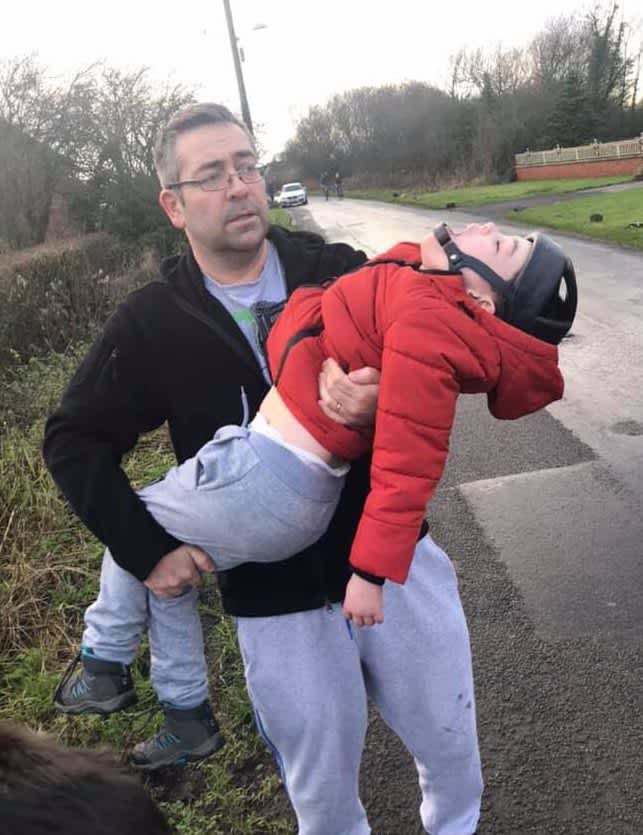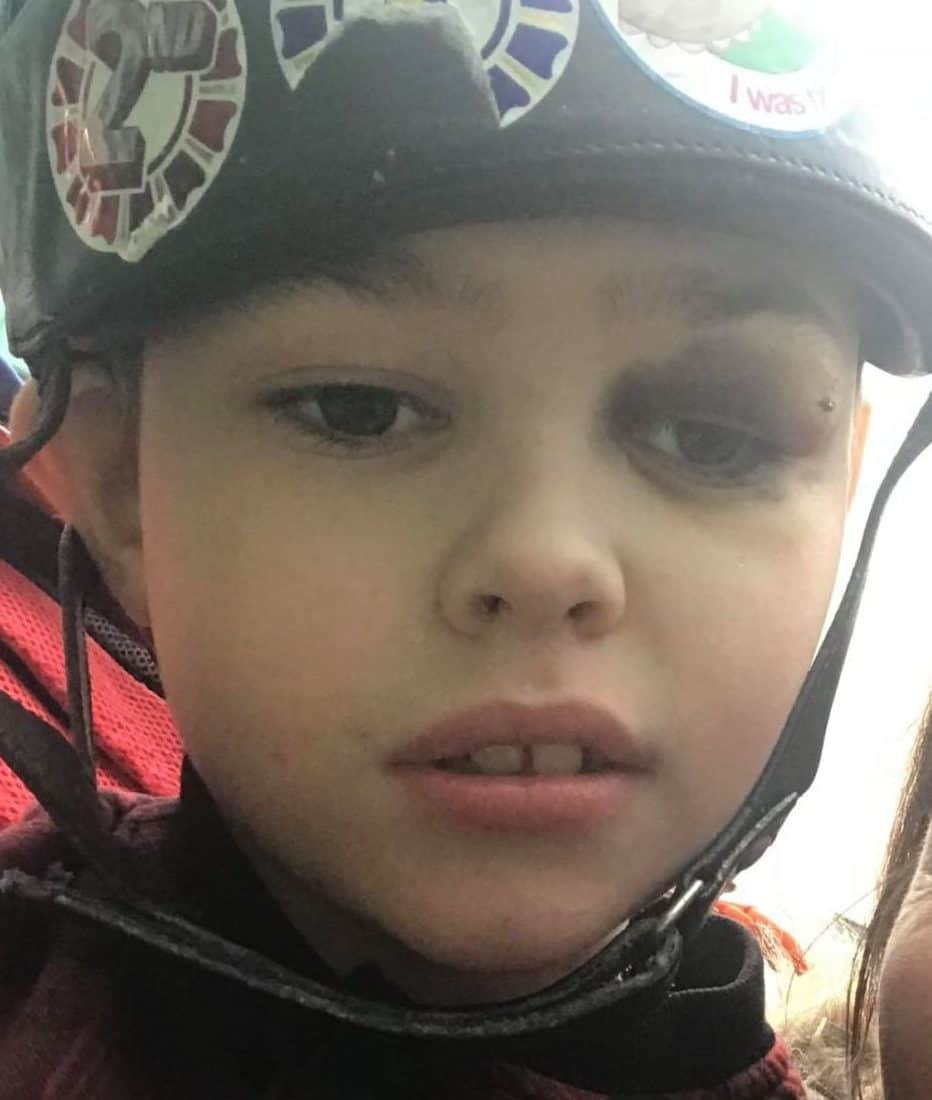British mother fears severely epileptic son will die after hospital blocks its own consultant prescribing medicinal cannabis
- Ben Griffiths, 9, suffers drug-resistant epilepsy and cerebral palsy, experiencing up to 300 seizures a day
- In October he was prescribed Epidiolex, but Alder Hey Children’s Hospital is preventing it being administered
- His mother believes the decision is putting her son at serious risk of permanent disability
A British mother has condemned Alder Hey Children’s Hospital for denying her severely epileptic son medicinal cannabis he could potentially die without.
Ben Griffiths, 9, from Lancashire, was born with cerebral palsy. At just six-months-old he was diagnosed with severe epilepsy, which has since been found to be drug-resistant.
The brave child’s condition is so severe it has caused multiple serious injuries, putting Ben in hospital twice last year with a suspected fractured skull.
Surgery has been put forward as an option, but carries the potential to further disable the child.
Great Ormond Street, where Ben was being treated before 2018, told his parents Joanne and Paul, that they could so no more for their child.
Joanne and Paul decided against surgery because it brings a high risk that he will be physically disabled.
Speaking to The I, Joanne, his mother, said:
“He already has a weakened right side from his cerebal palsy but he can walk – we don’t want to cause him any further brain damage.”

Ben was prescribed Epidolex last October after his seizures worsened. Epidolex contains less than 0.1% THC.
According to The Guardian, more than 50 children in the UK have already been treated with Epidolex on a compassionate access programme, which allows a patient with an immediately life-threatening condition or serious disease or condition to gain access to an investigational medical product (i.e. medical cannabis).
Despite Ben’s neurologist giving his backing for the use of medication containing more than 0.1% THC, the move has been blocked by Alder Hey following a panel meeting.[/fusion_text][fusion_text]In a tearful interview with The I, Joanne explained her hears that the seizures, which are increasing in severity and frequency, could be causing Ben further brain damage:
“We have tried him on dozens of anti-epileptic medications over the years and they have failed to work.
“I see the fear in his eyes when he has the seizures. It breaks my heart. He can have anything between 250 and 300 fits a day.
“Some children with uncontrolled epilepsy are getting cannabis and others aren’t.

“There is clear clinical need for this for Ben yet Alder Hey are blocking its own consultant’s wishes.”
“We never stop worrying about him falling and hurting himself.
“We have bean bags all around the house and we cover the cabinets and sharp edges with bed sheets. But we can’t totally eliminate the risks for him.
“He’s a happy boy who loves life and the water but he’s had a fit while swimming at school and bumped his head.
“He can’t do these things that normal kids do anymore because he could die.
“We had spent the whole festive period cooped up at home so we thought we’d get out of the house and give the kids a break with a dog walk.
“Now Ben can’t walk or go anywhere because he has a fit every minute or two. If he does get up, he will hit the floor.
“He was screaming hysterically while fitting so we had to take him to hospital. His condition is very bad.”
“Some children with uncontrolled epilepsy are getting cannabis and others aren’t. There is clear clinical need for this for Ben yet Alder Hey are blocking its own consultant’s wishes.”
– Joanne Griffiths, Medical Cannabis Warrior
Joanne believes that while Ben’s current Epidolex prescription, containing only CBD and a trace amount of THC, initially managed to bring down the number of seizures, he needs a greater amount of the psychoactive cannabinoid:
“The Epidiolexis had a beneficial effect and dramatically reduced his seizures down from around 80 to 100 a day at the time to one to 20 a day.
“But then it stopped being as effective. His doctors then wanted to try him on a larger dose of an anti-epileptic drug we’d tried before which I was happy to give a go.
“But his fits got even worse and rose to up to 300 a day and they reduced this medication.
“We now want him to try Tilray and Bedrocan which come in higher THC form. Ben has already shown to be responsive to cannabis.
“It may now be the case that we need to find the right type – some THC along with CBD – and dose but we are being denied the chance.”
Joanne added that parents of children with severely uncontrolled epilepsy should not be put in a position where they are forced to fight for access to cannabis medication containing THC:
“Alder Hey say that the effectiveness of cannabis isn’t proven but it’s clear it’s helping kids like Charlotte Caldwell’s son so how can they say it won’t help my Ben when nothing else is working?
“They don’t know the long-term effects of THC on children’s brains but when the risk that their illness will kill them is greater it should be prescribed.
“That argument doesn’t even apply in our case as Ben has the mental capacity of a ten-month-old baby from his cerebral palsy and we’ve been told he won’t develop any further.
“We need the cannabis to control his fits and keep him alive.”
The family have requested a second opinion and to be referred to a neurologist in the Netherlands.
A spokesperson for Alder Hey Children’s NHS Foundation Trust said the trust cannot comment on individual cases:
“Neurologists at Alder Hey will consider whether a child is eligible to take cannabis-based medical products taking into account a number of factors.
“This includes the clinical history of the child, the scientific and clinical evidence for use of cannabis based medical products in particular clinical situations, and the published guidance from NHS England and the British Paediatric Neurology Association (BPNA).
“Alder Hey always works closely with families to discuss treatment options.”
Despite an increasing amount of clinical research which supports the use of medical cannabis for conditions like Ben’s, a stigma still exists amongst medical professional against cannabis.
Even with a prescription, patients are still being denied vital access to a life-saving drug, simply because of its source: cannabis.
While children in America and Spain are being treated with medical cannabis, with great success, British patients are being denied access.
Is Joanne right? Is it not fair to deny her child cannabis when others benefit?

I have checked all over the UK news and there is nothing about thus case whatsoever